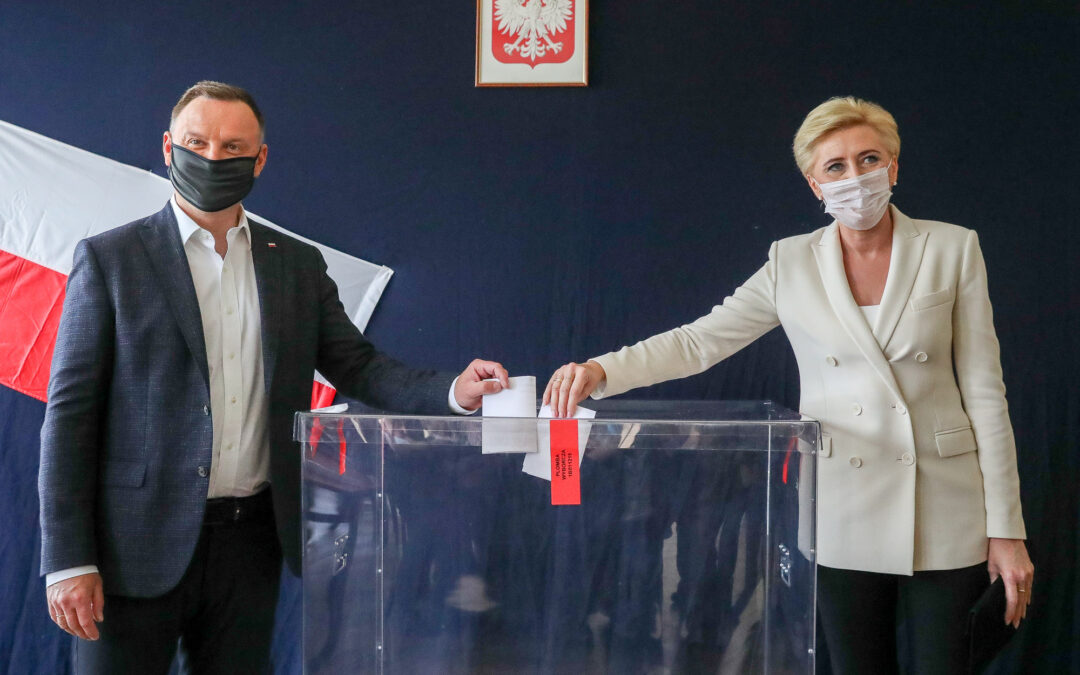This article will be updated as further exit polls, official results and other news emerge. You can also follow us for more updates on Twitter and Facebook.
Immediately following the close of voting in Poland’s presidential election at 9 p.m. this evening, the first exit poll has been released by Ipsos.
The results indicate turnout of 62.9% (which would be higher than in all but one Polish post-1989 election of any kind) and the following results for the main candidates:
- Andrzej Duda: 41.8%
- Rafał Trzaskowski: 30.4%
- Szymon Hołownia: 13.3%
- Krzysztof Bosak: 7.4%
- Robert Biedroń: 2.9%
- Władysław Kosiniak-Kamysz: 2.6%
(Update: on the electoral commission has confirmed the final results: 43.5% for Duda, 30.5% for Trzaskowski, 13.9% for Hołownia, 6.8% for Bosak, 2.4% for Kosiniak-Kamysz and 2.2% for Biedroń. Turnout was 64.5%.)
The results are largely in line with pre-election polling, which showed incumbent president Duda, who is supported by the ruling national-conservative Law and Justice (PiS) party, finishing comfortably in first place but failing to gain the majority of votes required to avoid a second-round run-off on 12 July between the two candidates that win the most votes.
As predicted, his closest challenger – and rival in that run off – is Trzaskowski, the mayor of Warsaw and candidate of the main centrist opposition, Civic Coalition (KO). Hołownia, in third, is a journalist and TV presenter running as an independent candidate.
Polling has shown a potential second-round run-off between Duda and Trzaskowski to be extremely close, with many voters of other opposition candidates likely to rally round Trzaskowski.
U nas już po głosowaniu.🙂 Kochani, nie czekajcie do ostatniej chwili, bo kolejki do lokali wyborczych są spore w całej Polsce. Najważniejsze, aby każdy mógł zagłosować, więc idźcie jak najszybciej!✌️🇵🇱 pic.twitter.com/UhiTpQm0d0
— Rafał Trzaskowski (@trzaskowski_) June 28, 2020
Exit polling was made more challenging by the coronavirus pandemic and resultant expansion of postal voting, which had previously been tightly restricted and rare but for today’s election was open to anyone who had requested it.
Almost 530,000 people registered to vote by post out of Poland’s 30.2 million eligible voters. Around 185,000 of those were in Poland itself. But the remaining majority were Polish citizens abroad, most of whom were only allowed to vote by post due to local lockdown requirements.
As a result of the extended time needed for embassies to receive, count and submit votes from abroad, the National Electoral Commission (PKW) said on Friday that the final results of today’s election will not be released until Tuesday or Wednesday.
The results also confirm the recent rise in support for far-right candidate Bosak, representing Confederation (Konfederacja), an alliance of nationalists and right-wing libertarians that entered parliament last year with 7% of the vote. Bosak had been polling around 3% in February, but has steadily risen since.
Heading in the opposite direction has been Robert Biedroń, the candidate of The Left (Lewica). While his group entered parliament last autumn with 12.5% of the vote, Biedoń has been polling in single (and declining) figures throughout the presidential campaign.
The last of the main candidates, Władysław Kosiniak-Kamysz, represents the agrarian Polish People’s Party and anti-establishment Kukiz’15, who together got 8.5% in the parliamentary election. He has, like Hołownia and Biedroń, see his polling numbers drop in the final weeks of the campaign.
This year’s elections have been held in unusual and controversial circumstances. They were initially scheduled to take place on 10 May, but that vote was abandoned at the last minute by the authorities after they failed to organise a postal-only ballot.
That forced a new election to be called for 28 June, with voters allowed to choose between postal or in-person voting and new candidates allowed to stand – though Trzaskowski was the only one who did so, replacing KO’s Małgorzata Kidawa-Błońska.
After Trzaskowski, who has advocated greater LGBT rights as mayor of Warsaw, entered the race, first PiS and then Duda himself added anti-LGBT rhetoric to their campaign. The president also made a last-minute visit to the White House, where Donald Trump praised the “incredible job” Duda has done.
Sanitary measures were in place at polling stations today, with staff and voters wearing masks, disinfectants on hand, and distancing requirements in place. Large queues were reported outside many polling stations.
However, the nature of the decision to abandon May’s election, the last-minute changes to the electoral code, and the fact that some voters abroad were unable to cast their votes has led to questions over the constitutionality of the election – and opens the possibility for the results to be legally challenged.
Main image credit: Grzegorz Jakubowski/KPRP/prezydent.pl

Daniel Tilles is editor-in-chief of Notes from Poland. He has written on Polish affairs for a wide range of publications, including Foreign Policy, POLITICO Europe, EUobserver and Dziennik Gazeta Prawna.




















